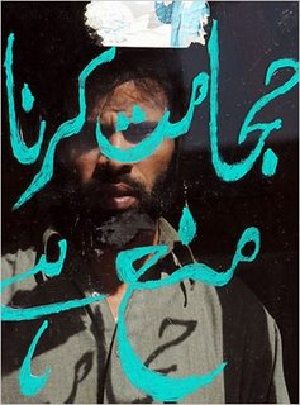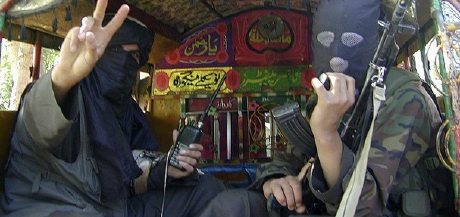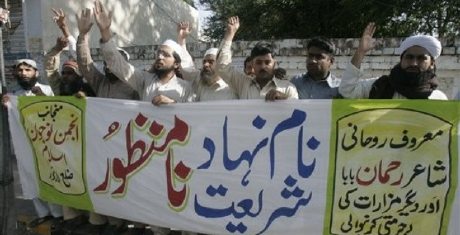Manan Ahmed (Sepoy @ Chapati Mystery)
 The Pakistani Parliament has now passed the bill authorizing Sharia laws in Swat – and perhaps in other territories. Punjab, according to the NYT report, United Militants Threaten Pakistan’s Populous Heart is also in grave danger of going Islamic in a meta-way. Baluchistan has broken out into violence and protests since the president of the Baluch National Movement, Mir Ghulam Mohammad, was kidnapped (along with two other senior associates), shot to death and then their bodies ditched from a helicopter. The primary suspicion falls upon the military or military intelligence. That leaves us Sindh. Karachi, the biggest city in Pakistan, is having a battle of the bands. More seriously, it is also been the scene for ethnic riots against the Baluchi recently.
The Pakistani Parliament has now passed the bill authorizing Sharia laws in Swat – and perhaps in other territories. Punjab, according to the NYT report, United Militants Threaten Pakistan’s Populous Heart is also in grave danger of going Islamic in a meta-way. Baluchistan has broken out into violence and protests since the president of the Baluch National Movement, Mir Ghulam Mohammad, was kidnapped (along with two other senior associates), shot to death and then their bodies ditched from a helicopter. The primary suspicion falls upon the military or military intelligence. That leaves us Sindh. Karachi, the biggest city in Pakistan, is having a battle of the bands. More seriously, it is also been the scene for ethnic riots against the Baluchi recently.
In the meantime, the Obama administration has, to this point, authorized over 60 drone attacks for an al-Qaeda kill rate of 2%. Wonderful.
So, given all this, is there a likelihood of an Islamic Revolution in Pakistan? Is it Game Over?
Before we get there, I want to review a couple more things about Pakistan and its relationship with its constitutive parts. Swat merged with Pakistan, constitutionally speaking, in 1969. However, it has retained the status as a “Special Area†granted under the Yahya Khan One Unit proclamation of 1955. This special status was is recorded into the 73 Constitution, Article 247. According to this status, they are free to make their own laws and govern themselves. The President can, from ‘time to time’, give some directions to the Governor but the Parliament, Supreme Court or any High Court has no jurisdiction. So, the Swat ‘Sharia’ deal is a capitulation insofar as Pakistan has never amended its Constitution to make the FATA territories squarely under its law. Additionally, the Swat deal seems to be the only way to curb Maulana Fazlullah. If Obama is going to talk about ‘good’ Taliban in Afghanistan, Pakistan certainly has the right to make political negotiations to get a cease-fire. The human impact of the last 3 years on Swat valley has been intense – over 300,000 have fled.
Baluchistan, another princely state which was militarily merged with Pakistan after Partition, had no role in the federal state. After the 1955 One Unit Proclamation, the Khan of Kalat tried again to declare sovereignty. General Tikka Khan (‘the butcher of Bengal’) was sent to Baluchistan in 1958 under Ayub’s military rule to enforce federal writ. Things simmered until Bhutto has to send more army troops against another militant uprising in the region from ’72-74. So, there is no love lost between the center and Baluchistan.
Sindh, Karachi, and the Mohajir Qaumi Movement (MQM) are another beeswax. Only recently, rumors were afloat that Musharraf was cutting a deal with MQM and give them autonomy under a federated Pakistan.
Now, to return to this ‘question’.
I would argue that such a formulation of impending doom is one of the main reason Pakistan is in this mess. There is a rich vein of ‘Pakistan on the Brink’ theorization that has dominated US foreign policy since the 50s. Back then, it was the Communist revolution, and now it is the Islamic one. This particular mind-set has propelled one disastrous policy over another for the last 40 years. We have supported dictator after dictator and stood by, silently, when civilian regimes floundered under internal economic and political crises. Once again, this question dominates the Obama policy and will restrict any real re-thinking of the Pakistan issue or re-evaluation of the regional scene. So, let’s just categorically understand that:
- There is a world of difference between ‘Taliban’ and any given Pakistani citizen, even the most devout believer. The Taliban, strictly understood to be warlords operating with or in support of Mullah Omar, are a very particular political group. They are political. They have political goals. They are not, in effect, a religious ideology that has the danger of sweeping Pakistan. They don’t have doctrinarians or theologians. Al-Qaeda does. Taliban don’t. It may seem like splitting hairs but I think it is very important to differentiate between the historically situated Taliban and the groups that have emerged in Pakistan bearing the name ‘Taliban’. In the later case, the term is actually masking other political goals and differences that we need to be carefully attuned to. Similarly speaking, there is a world of difference between a specific political group, however broadly defined, which can be numbered in the thousands and a state of 160-plus million peoples. The people of Pakistan have demonstrated, through a number of elections over the last 60 years, that they do not want their religious leaders in political power. There is no dismissing that reality.
- The most powerful entity in Pakistan in its national army. The second most powerful entity is its civil bureaucracy. The third most powerful are the landed and industrial elite. None of these entities are about to give it up (whatever ‘it’ is – from nukes to bank accounts) to some ragtag bunch of jihadis. Certainly Zardari, wants to keep everything, don’t you know it.
- There is a robust, active, critical media. A media which has played a prominent role in some amazing events in civil and political theaters in the last 3 years.
So, I reject the premise in which the Swat Deal becomes a stepping stone to the ‘Talibanization’ of Pakistan.
Second, Pakistan has always been the Islamic Republic of Pakistan. Pakistan has always self-imagined itself to be a ‘homeland for Muslims’. The question really is: what kind of a homeland?
Saudi Arabia is a homeland for Muslims. It has Shari’a and a King. Malaysia is another homeland for Muslims – with a different sort of emphasis. Turkey, with its emphatic secularism, falls on the far end of such a homeland for Muslim spectrum. Where does Pakistan fit in? And where does it intend to go? I think that is the more important question. What is Pakistan to Pakistanis now? Who is a Pakistani, in effect? As I pointed out in an earlier discussion on the idea of Pakistan, there has to be a fundamental re-articulation of Pakistan as an entity, as a nation-state, within its constitutive parts. The urgency of this task is evident – there are other claimants with answers. Claimants who carry guns and who can brutalize a population in the blink of an eye. There is also the United States agenda, which continues to treat Pakistan as nothing more than a client-state. Somewhere in this pincer, somewhere between the taliban and the drone, the Pakistanis have to begin forming a sense of their whole. I am not big on nationalism and I don’t think that re-imagining Pakistan as a nation is an easy task, either. But, I am not simply talking about some ideological mumbo-jumbo that Islamabad can cook-up.
The most crucial step is that the civilian federal state of Pakistan has to listen – really, actually, listen – to the people of FATA, the people of N.W.F.P, the people of Baluchistan, the people of Sindh and the people of Punjab. It has to provide its citizens with basic security, shelter and welfare. It needs to protect its citizens from terrorism. It needs to strengthen its civic engagement with non-governmental organizations. It needs to ensure that basic human rights and access to a basic educational system is guaranteed to all citizens. These are actions that can be taken and should be taken and they will have a far greater impact than any 1.5 billion dollar aid. The Pakistan military, and the US, must allow for this. It must enable the state, it must pressure the state to fulfill its pledges to the people. Part of that means a military operation against the Taliban (narrowly defined) and al-Qaeda (defined as ‘foreign fighters’ in the press) in Swat and in Baluchistan. This must be under-taken by the Pakistan military.
From such a process, a major process of stabilization, the state can start to re-build.
It’s a tall order, I know. There are too many de-stabilizing forces. Not to mention, an open question mark over whether there is actual political will to do all this. Yet, I remain hopeful. Pakistanis – however we categorize them – have a lot of heart, a lot of soul and great fortitude. For the last 8 years, they have been paying the price of a proxy-war waged on their soil. A decade before, they suffered through another proxy-war which gave them millions of refugees and a radicalizing ideology. They have persevered. I am still in awe of the hundreds of thousands who galvanized against Musharraf and the millions who cast a vote in the election last year. We must support those many millions in taking the next step.
Manan Ahmed blogs as Sepoy at Chapati Mystery where this post was first published and discussed. This was originally written some two weeks ago. Much hass been happening in these two weeks but the essenace of the argument remains unchanged. Hence it is being carried as originally written.





















































I hope you are right and Pakistan will not become a theocracy. But I do wonder!
Folks! Take religion out of this. This is not about ISLAM.
Also, don’t place fault on the people of Pakistan.
I don’t think the fault lies with people of Pakistan.
The fault fully and squarely lies with the ARMY.
There are four reasons for why the responsibility of removing Taliban lies with the ARMY:
Firstly, majority of people are poor and hardly care about what happens in other parts of the country. Their major concern is food and shelter for their immediate family.
Secondly, who created this monster? Was it the people? No it was the ARMY.
Thirdly, the Army has been in control of Pakistan since it’s inception and especially the last ten years. Their rule has eroded all institutions including building of political leadership. Repeated martial laws in Pakistan has been the core reason for lack of political leadership. People didn’t get a chance to churn out the bad politicians. Evolution didn’t take place.
Fourthly, law and order is the purview of security forces. In places like SWAT, where police has no power, ARMY has to step-in. But please be quick and get it over with. Don’t play games of HEAT-ON and HEAT-OFF. Get it done. One week’s sustained effort is enough to root out all Talibans. Show some guts and leadership. You want me to show you. This is how. Cut off all supply roads to SWAT, assassinate Sufi, Fazal and other hunchos. Move in.
Someone in this forum mentioned that Taliban are so vicious they killed 30 people in civil and political administration. JEE WIZZ. Does that mean you would abandon a major city (SWAT)?
What will happen if a group commits 30 murders in Lahore, Karachi, New York or London? Will the security forces pack and leave town. Will they wait for the politicians to pass legislation? Isn
The world will be a much better place when people who claim to be defenders of religion realize that it is fundamentally irreligious to force others to conform to some religious norm. The Quran clearly says that the only judge for whether somebody is virtuous or not is God. If humans start becoming judges of others’ character, it is the highest form of sin, since it involves pretending that one has the powers that God does. Similarly, other religions essentially say the same thing – that only God (and the person himself/herself) knows what is in somebody’s heart and can judge that.
Religion can be a positive force in society if it makes people look inwards, to strive to be better people, to judge themselves. It is not a necessary condition to achieve virtue, but it can be helpful as it externalizes a difficult internal challenge and in the process makes the challenge somewhat easier. But it has been cause for great trouble and strife whenever humans have used the pretext of religion to judge others.
In the long term, survival of the human race will depend on whether we successfully convert religion as a force to judge oneself (if at all one is religious) and prevent it being used to judge others (or at least prevent actions based on such judgement). Societies that have become more secular over the years (not necessarily irreligious, but secular in the sense of separating laws from religion) have moved along this path, using the might of the state to prevent people from taking action based on judgement of others derived from religion and punish those who do it anyway
Getting off my soap box now. Thanks for reading this.
i am not in favor of Taliban Islam because it is not true Islam it is Wahhabi Islam .
@ Amir Ali…
I couldnt agree with you more when you wrote:
‘The fault lies with the people of Pakistan who chose lies, denial and conspiracy after 9/11, and continued to provide support, recruits, money and shelter to all types of terrorists. Witness the heroes welcome the cross-dressing Lal Masjid mullah just got.
In such a situation Army alone cannot win’
The martyrdom that our soldiers embrace fighting against these Khwarhji’s is cheapened by that fact that it is done fighting for this cowardly and confused mob of a nation…